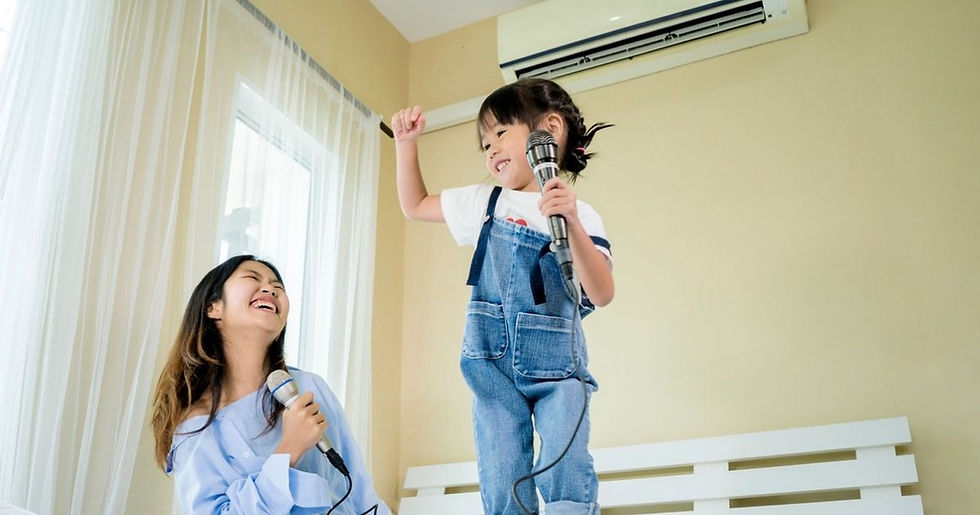Empowering Children to Express Themselves through Music Education
- Maisie Loh
- Aug 8, 2023
- 2 min read

Music has the incredible ability to transcend language barriers and touch our emotions in profound ways. Music education for children offers a unique avenue for self-expression and personal growth. This article explores the transformative potential of music education in fostering creativity, emotional intelligence, and self-discovery among young learners.
The Power of Music in Early Childhood Development
From infancy, children are naturally drawn to the rhythms and melodies that surround them. Engaging with music at an early age can have a profound impact on their overall development. Music stimulates multiple areas of the brain, enhancing cognitive skills, language acquisition, and memory. Moreover, it provides a platform for emotional expression, enabling children to communicate feelings that words alone may fail to convey.
Nurturing Creativity and Imagination through Musical Exploration
Music education encourages children to explore their creativity and imagination. By experimenting with different instruments, rhythms, and melodies, young learners can tap into their innate artistic abilities. Musical activities, such as improvisation and composition, allow children to express their unique thoughts and emotions. This process nurtures their creative thinking skills, encourages risk-taking, and builds confidence in their ability to share their ideas with the world.
Cultivating Emotional Intelligence and Empathy through Music
Music has an extraordinary capacity to evoke emotions and create a sense of empathy. By actively engaging with music, children can better understand and regulate their emotions. Singing, playing instruments, or listening to music helps them connect with their inner feelings and express them in a healthy manner.
Through collaborative musical experiences, such as group performances or ensemble playing, children learn to appreciate and respond to the emotions expressed by their peers, fostering empathy and social awareness.
Building Communication and Self-Confidence through Performance
Performing music in front of an audience is a transformative experience for children. It requires them to communicate their emotions and ideas effectively, while also developing stage presence and self-confidence. Whether it's a solo performance, participating in a choir, or playing in a band, music education provides opportunities for children to showcase their talents, receive feedback, and learn from their peers. This process not only enhances their musical abilities but also equips them with valuable communication skills that extend beyond the realm of music.
Music education holds immense potential for children to express themselves authentically and explore the depths of their emotions. By fostering creativity, nurturing empathy, and building self-confidence, it empowers young learners to navigate the world with a deeper understanding of themselves and others.
Use the transformative power of music education and help your kids develop natural self-confidence and emotional intelligence by exploring our music program at Ritmo Music Studio in Singapore.







"Best Companies to Buy Twitch Viewers" signifies a deliberate focus on quality and reliability. In a landscape where numerous platforms and services vie for attention, discerning streamers are increasingly recognizing the importance of choosing reputable companies. This headline positions the act of purchasing Twitch viewers as a calculated move, emphasizing not just the desire for numbers but a commitment to maximum impact.
Beyond the impressive array of amenities, The Florence Residences benefits from its strategic location in the vibrant neighborhood of Hougang. Residents enjoy easy access to an abundance of dining, florence residences shopping, and entertainment options. The nearby Hougang Mall and Heartland Mall provide a plethora of retail outlets and dining establishments, ensuring that residents have everything they need right at their doorstep.
Optimizing the architecture of a neural network involves adjusting the number of layers, neurons, Model Optimization activation functions, and connections. Techniques like transfer learning, where pre-trained models are fine-tuned for specific tasks, can significantly enhance performance while reducing training time.
Citizens play a vital role in advocating for "Law for the People." Grassroots movements, community organizations, and Law for the People advocacy groups can raise awareness about the importance of legal accessibility and push for policy changes that prioritize the rights of individuals.
Hand Sanitization Stations Hand sanitization stations are strategically placed throughout the showflat, grand dunman showflat allowing visitors to sanitize their hands before and after their visit. This helps prevent the potential spread of the virus through touch.Face Mask Mandates Wearing face masks is typically mandatory for all visitors and staff inside the showflat. This measure significantly reduces the risk of respiratory droplets spreading the virus.